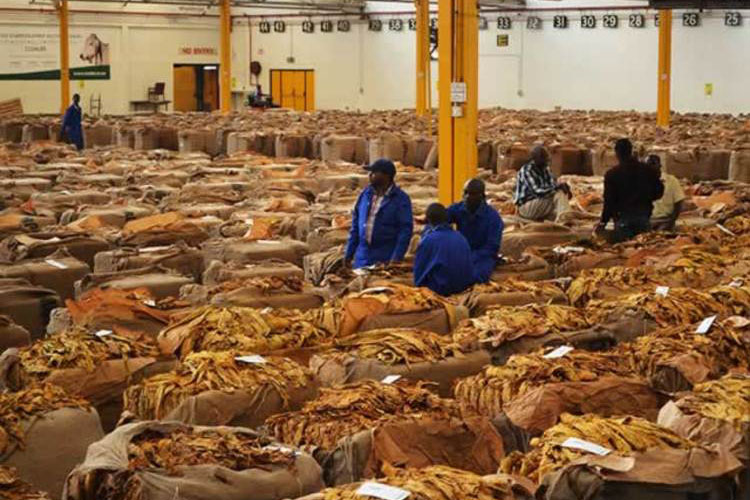
The Sunday Mail

Tendai Chara
There are no cases of Covid-19 that have been reported at tobacco auction floors since the marketing season began on April 29 — more than four months ago — as the new health protocols helped to keep the virus at bay.
Over the years, farmers used to gather to sell their crop at auction floors, mainly in Harare, but this year this was not possible due to the outbreak of the coronavirus.
The need for social distancing meant industry regulator, the Tobacco Industry and Marketing Board (TIMB), had to come up with new regulations to prevent the spread of the virus.
In a major break from the past marketing seasons, tobacco auction floors were resultantly decentralised, which did not only eliminate the possibility of congestion at the auctions, but brought the market closer to the growers.
“I am pleased to say that there has been no confirmed case(s) of the coronavirus infection at all the floors. As the tobacco industry regulator, we put in place strict measures that are meant to curb the spread of the disease, and it has worked thus far,” said TIMB chief executive officer Dr Andrew Matibiri said.
The move to decentralise auction floors was cheered by farmers who had long been complaining about punitive and extortionate transport costs.
“Apart from reducing costs and eliminating the inconveniences associated with farmers congesting in auction floors in Harare, decentralisation has helped, to a greater extent, in the control of the spread of the coronavirus among farmers,” he said.
The risk of farmers spending days at the auction floors as well as falling prey to marauding thieves and commercial sex workers in the capital was eliminated.
Harare is presently the country’s hotspot of Covid-19 as it leads in both confirmed new cases and the number of deaths reported.
“It is important that the number of farmers that travel to Harare is minimised so that new infection figures are kept low. As TIMB, it is our responsibility to ensure that our farmers are safe and regulations are adhered to,” added Dr Matibiri.
As part of measures to contain the spread of the disease, informal trading outside the floors was banned. Farmers were not allowed to sleep outside the floors while waiting to sell the commodity.
TIMB says decentralising auction floors is part of Government’s devolution exercise.
Boka Tobacco Floors (BTF) has since established new sales floors in Karoi, Mvurwi and Rusape.
Accordingly, farmers in three provinces — Manicaland, Mashonaland West and Mashonaland Central — had the convenience of selling their crop in respective farming areas.
The challenges and cost of transporting the crop to Harare, for example, from the main growing regions has been one of the factors behind the switch by growers from tobacco to other crops.
BTF CEO Mrs Chido Nyakudya said during the current marketing season, there was “minimum contact” due to the new measures.
“This marketing season was challenging in the sense that one of our major priorities was to make sure that our workers and clients are protected from Covid-19.
“Due to decentralisation, I am pleased to say there was minimum contact and no infections reported at our auction floors,” she said.
Mr Wonder Munyoweri, a farmer from Chinhoyi, who sold his tobacco at BTF, said decentralisation could have been the magic wand that prevented the spread of the disease.
“In terms of our safety from Covid-19 infections, I think the move proved to be the magic wand. The floors were not congested and we sold our tobacco hassle-free, a case of walk-in and walk-out,” Mr Munyoweri said.
Another farmer from Karoi, Mr Daniel Arifaneti, said: “We had banks at the floors as opposed to what we used to do in the past; we got our money instantly. Decentralisation of sales floors is the best thing that has happened in the tobacco marketing sector in recent years. This indeed is a game-changer for us.”
The auction in Mashonaland West serves farmers in Hurungwe District and surrounding areas that include Tengwe, Kazangarare, Nyama resettlement, Nyamakate and Magunje.
“Unlike in Harare, there were no pickpockets or commercial sex workers to worry about. I know of many farmers who lost their money to these people. Some farmers even lost their cars,” said Austin Chimbwanda, a Manicaland-based farmer who sold his tobacco in Rusape.
Communities are set to benefit from increased activities in their backyards.
BTF, for example, whose auction floor in Harare was once considered one of biggest auction floors in the world, is constructing what could easily be the biggest structure in Mvurwi.
The facility, which measures an estimated 15 000 square metres, could be ready by the 2021 selling season.
It is expected to create employment opportunities for locals.
Grocers, hardware, furniture and other businesses could enjoy brisk business.
There is, however, need to increase the number of banking options at the new markets, according to farmers.
Negotiations with banks are reportedly underway.
Tobacco output reached an all-time high of 259 million kg last year, but deliveries are expected to drop to 230 million kg as last year’s planted area was affected by late rains.
Figures availed by the TIMB shows that more than 181 million kilogrammes of tobacco have been sold so far, with US$479 million having been earned thus far.
By this time last season, tobacco sales had topped US$481 million.
Tobacco is Zimbabwe’s second-largest foreign currency earner after gold.
Last year, exports of the crop, mainly to China, South Africa and some European countries rose to US$750 million.
Zimbabwe is considered the fifth-largest producer of flue-cured Virginia tobacco in the world. It is the largest producer of the crop in Africa.



